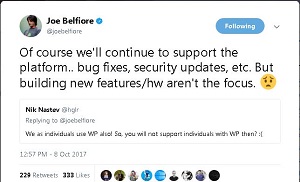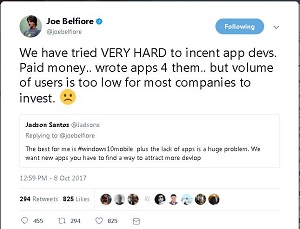News
Microsoft Exec Tweets the Death of Windows Mobile
Microsoft has continued to churn out new Windows 10 Mobile builds even in the face of 0.1 market share, never officially admitting the project was a dead end despite much industry speculation.
On Sunday, a tweet signaled the end: "Of course we'll continue to support the platform.. bug fixes, security updates, etc. But building new features/hw aren't the focus" -- followed by a frowning emoticon.
That tweet was from Microsoft exec Joe Belfiore, in response to the question: "Is it time to leave Windows Mobile platform?"
 [Click on image for larger view.] Tweeting the End (source: Twitter).
[Click on image for larger view.] Tweeting the End (source: Twitter).
The corporate vice president of Windows and Devices -- who admitted he used an Android phone -- shed further light on the subject in a series of tweets, all adorned with unhappy emoji, including: "We have tried VERY HARD to incent app devs. Paid money.. wrote apps 4 them.. but volume of users is too low for most companies to invest."
That lack of incentive to invest resulted in what industry player VisionMobile referred to as the "app-gap." Despite being lauded for its technical prowess in the mobile space, Windows Phone/Mobile was caught in a downward spiral attributed to a vicious cycle wherein lack of interest by users and developers reinforces the downward trend of both camps.
It's kind of a catch-22 situation caused by the lack on inventory on the Windows store compared to the "big two" of Android and iOS. Users are turned off by the poorer selection. Less marketing potential turns off developers, so fewer new apps are created, which further turns off consumers, and so on.
"Unfortunately, lack of scale means that the top new apps come to the Windows Phone platform quite slowly, if at all, and many others are not updated," VisionMobile said a couple years ago. "This leads to the vicious cycle of self-selection, also known as the app-gap -- most users who care about apps don't adopt Windows Phone and so in turn the platform isn't as interesting to the top developers."
But as late as this summer, Microsoft continued to issue Windows 10 Mobile previews, with one recent release even introducing new emoji icons.
 [Click on image for larger view.] Belfiore: We Tried (source: Twitter).
[Click on image for larger view.] Belfiore: We Tried (source: Twitter).
On Twitter, hundreds of users acknkowledged the finality of Belfiore's words, expressed in less than 140 characters:
- Then its a failure.
- you're just realizing this now
- You should find a way to compensate those people how trusted and bough WP and you let them down.
- In other words dead.
- Lol it's official
- glad it's officially confirmed now.
- This is pure tragic.This is bad for the whole company in the long term.
Over on Hacker News, there was more consternation. The top comment at the time of this writing was:
I was working in Microsoft about 5 years ago and Satya's not lying when they say they tried everything to incentivise app developers. It was a big focus of the company at the time. For keystone apps they tried to partner with developers doing most of the work for them. For more niche apps they ran promotions for students and independent developers giving away free phones etc. But nothing was enough to get over the problem of the lack of an initial user base.
Most Windows phone owners I know (myself included) loved the design (hardware and software), the customisability, etc. but the lack of apps ultimately made us move to another ecosystem.
Other comments included:
- Im still on the platform. I was holding out, hoping for something. But I guess my current phone will be my last windows phone. Sad
- Windows Mobile is my favorite example of ecosystems being more valuable than individual user experiences.
- While I understand Microsoft's efforts at trying to approach the mobile space, it does seem that it's often at the expense of their core product - very similar to how Google nearly crippled their core offering by integrating everything with Google+.
- I'm more interested in: what's the future for UWP apps now? Another dead end like silverlight?
- Where does this leave Windows Universal Development? Hardly Universal if it's only for Windows 10 desktop. I'm no Windows nor Xbox user, but do people develop using Universal for both? Are there other platforms right now worth targeting for Windows Universal?
- The existence of Windows Phone was one of the more confusing efforts in the professional world. Microsoft had released an OS that, while itself was a capable OS, the ecosystem around it was unacceptable. The availability of apps was terrible, and those that were there were often not kept up to the standard that iOS and Android apps were.
Stay tuned for any official word from Microsoft with specific details.
About the Author
David Ramel is an editor and writer at Converge 360.